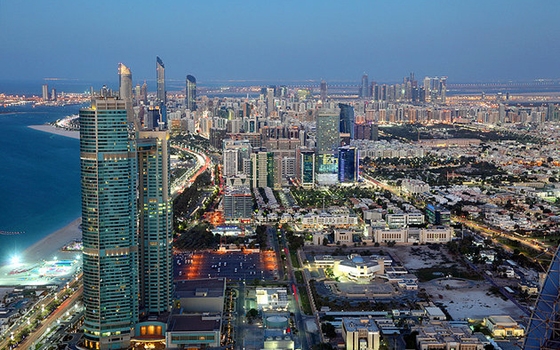Despite a sharp downturn in oil prices in the latter part of the year, Abu Dhabi’s economy maintained its solid pace of growth in 2014. Strong fiscal reserves, a low breakeven price of oil and an increasingly diversified economy should ensure expansion is maintained in 2015, though possibly at a slower rate than in past years.
In December, the Abu Dhabi Department of Economic Development projected an average rate of growth of 5.5% for 2014-2018. A month later, Standard Chartered Bank put its figure for 2014 growth at 4.5% and projected a slowdown this year to 3.8%, citing the expected contraction in the oil sector.
The uncertainty over oil will weigh on Abu Dhabi’s economy, though strong state reserves will ease pressure on the government, which has committed to maintain spending levels and to continue with its program of infrastructure and industrial investment in 2015. With an estimated budgetary breakeven price below $60 per barrel, Abu Dhabi is less vulnerable to pricing fluctuations in comparison to other oil producing nations thanks to its accumulated extensive fiscal buffers, according to ratings agency Fitch.
Solid bank performance
Abu Dhabi’s financial services sector performed strongly in 2014, with a number of the emirate’s leading banks posting double-digit profit growth for the year. The National Bank of Abu Dhabi (NBAD), the second-largest bank in the UAE, reported an 18% rise in net profit to AED5.57bn ($1.52bn) in 2014, year-on-year (y-o-y), with a 28% jump in fourth-quarter profit. Abu Dhabi Commercial Bank, the third largest lender in the local market, posted net profit of AED4.05bn ($1.1bn), up 20% on its 2013 results. Abu Dhabi Islamic Bank (ADIB) Group, the emirate's largest sharia-compliant bank, reported a 20.7% rise in net profit to AED1.75bn ($476m) y-o-y.
Strong liquidity is expected to sustain Abu Dhabi’s banks in 2015, with each of the ‘big five’ lenders posting a net profit in the first six months of the year. However investors will be waiting to see the effect of plummeting oil prices on first quarter results this year. A recent report by the IMF noted that banks in the region might struggle to diversify their credit portfolios due to the structure of the economies with non-oil sectors significantly linked to oil.
Despite high volatility in December across the region, the Abu Dhabi Securities Exchange (ADX) still finished 2014 in positive territory, rising about 5.5% during the year to reach 4,528.93 points, having shed about 11% in the last month of the year.
The ADX is looking at ways to diversify its range of investors this year by pursuing interest from foreign institutional investors whose numbers jumped from 380 in 2013 to 1,106 in 2014, thanks to the UAE gaining emerging market status in June. The exchange is also investigating ways to lure the country’s London-listed stocks back to Abu Dhabi through dual-listings.
Real estate growth slows
After being muted for much of 2014, inflation began trending up towards the end of the year, finishing at 4.1%, according to the latest data by the Statistics Centre Abu Dhabi (SCAD). This increase in the cost of living is forecast to continue into the first quarter, with SCAD predicting inflation to reach 4.3% y-o-y by the end of March, with rises in utilities costs set to impact the consumer price index.
The real estate market remained active throughout the year, though growth tailed off in the latter part of 2014 in response to uncertainty over energy prices. House prices were flat quarter-on-quarter during the final three months of 2014, according to two property reports. Real estate consultancy JLL reported that apartment prices increased by 18% in 2014 while villa prices in the capital rose by 25%, most of which was achieved during the first half of 2014.
Rents in some top-end residential developments also climbed sharply during the year as the removal of the state-imposed cap on increases at the end of 2013 allowed owners to set rates in line with the market.
However, caps on mortgages which have raised the limits for minimum deposits – a measure taken by the UAE Central Bank to restrict market fluctuations – as well as higher transaction fees, may have helped cool investor enthusiasm and curbed price rises. It will be some time before the impact of lower oil prices and a possible deceleration in growth rates in the real estate sector become clear.
Oxford Business Group
2 February






















































